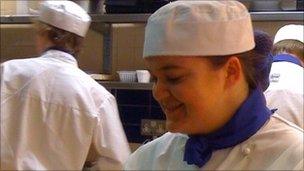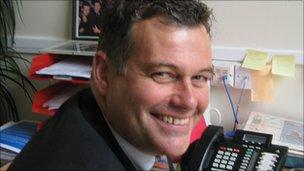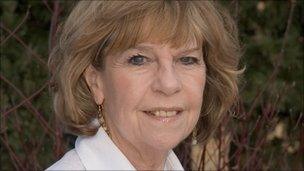Vocational courses: Your stories
- Published
Too many young people are doing vocational courses which boost league tables but have little or no value in the labour market, a review commissioned by ministers has concluded.
Some qualifications count in league tables for the equivalent of four GCSEs, which gives schools what the Wolf review called "perverse incentives" to get young people to study them.
But providers defend both the rigour and practical application of their courses. Ministers are keen to promote more "high quality vocational options", and many in the field point out that course subjects, levels and quality vary widely.
Professionals, parents and students told the BBC website about their experiences and views.
Michaela Fleming, catering student - "Really good for me"

Michaela Fleming, 18, is studying for a professional chef diploma at Westminster Kingsway college and wants to be a pastry chef.
She got 3As, 3Bs and 4Cs in her GCSEs, particularly enjoying food technology, PE, music and maths. She initially considered staying on for A-levels, but really liked the college approach when she visited and signed up straight away.
"I enjoyed school but I much prefer not writing - having a hands on approach to things. So coming here was really good for me. We do theory but the practical side is really good."
"I want to train to be a chef - we're actually cooking for customers at the moment, and I'm working part-time on top of this. Being able to do both and get the practical skills I need to go on to be a chef is really good."
"If I had had the opportunity at school to do a day a week here it would have been really good - I'm enjoying it much more here. If a lot of students had been able to do that, people would enjoy school a lot more."
Maggie Gusterson, parent - "Won't lead anywhere"

Ms Gusterson's 15-year-old son is studying vocational courses in science, construction, sports and ICT, as well as GCSE maths and English.
She says she is worried that they "will not lead him anywhere".
Her son "really struggled" at school and was told at 14 that he could select from a limited pool of options, most of which were vocational qualifications. She believes this is because the school wanted to maintain its strong league tables performance.
But her son has since "realised he needs to study hard", she says.
He enjoys sport and would like to go into sports therapy.
"He did want to do a proper science subject, because this science is not going to lead him to anything - he could have done biology or something like that."
Ms Gusterson left school with only two GCSEs, but by doing re-sits at college gained the qualifications required to go on to train as a nurse. She said she would prefer her son to take GCSEs and do the same if he did not get the grades on his first attempt.
"I think they should be given a little bit more chance," says Ms Gusterson.
"I think they should do it like in the olden days - you do the core subjects up to 16, if you've not been able to get your GCSEs, then you can look into going into vocational courses at 16, rather than at the age of 14," she says.
Christopher McShane, head teacher - "Dispel the league tables myth"

Mr McShane is the head teacher of Winton school in Hampshire, which he describes as a school with overall lower-ability intake.
"We need to dispel the myth that schools use vocational qualifications to improve our places in the league tables," he says.
Alongside GCSEs, the school offers Btecs and other vocational courses in photography, travel and tourism, hospitality and catering, ICT, sports leadership and management and performing arts.
He says all students, whatever their ability level, are free to choose whichever courses they want, and even if the vocational courses were equivalent to just one GCSE he would use them anyway.
"My job is about raising the self esteem of young people and to encourage them to continue learning - and the vocational qualifications do exactly that."
"If people came into my school and saw the kids doing sports coaching with primary students, or running their own business - people would realise they have a very significant impact."
"I have an issue over GCSE as a qualification and whether that's fit for purpose for the future. I think it's too narrow, it's almost based on whether you've got a good memory, rather than an understanding," he says.
While Mr McShane says he would question the value of some of the level 1 NVQs highlighted by the Wolf review, he believes there is a place for the Asdan "certificate of personal effectiveness", which has come in for criticism.
For young people who are "having a challenging time," he says, "it is actually a valuable qualification used in the right way".
"With those young people, what we're looking at is their emotional and social development as well as their academic development and it allows us to build a programme around that."
Brian Sharkey, former teacher - "Definitely easier"

Brian Sharkey taught on and off for six years before retraining as a driving instructor about four years ago.
He mainly taught GCSE science, but in 2002 was asked to take a whole cohort at an Essex school through a science course which was called "vocational" and worth four GCSEs.
"I was disappointed with the academic quality of the vocational qualification and believed they would have covered more science on the double award GCSE. It just didn't make sense to me. I felt that the children were being let down academically," he says. "It was definitely easier."
He gives one example of a question that asked where a student should go for further information - the answer being "in a book". A second question, he said, asked where you would go for more information - the answer, "in other books".
"Some kids were telling me that they wanted to become a vet and their parents were asking is this going to be adequate. I felt as teachers, as professionals, we were expected to say yes, but personally I thought no, it wasn't as good as the double award GCSE."
"I wouldn't want my kids to do it. I'd prefer their trying at the double award and doing their best, even if they get a lower grade."
Libby Reed, Cirencester College - "Route to achievement"

"I'm in charge of admissions and recruitment, so I'm very much involved in the guidance of students onto correct routes for them.
"There tends to be a view of vocational learning as for those who can't do and that's a load of rubbish. It is very much for certain types of students - this is their route to achievement."
Ms Reed says that some level 2 (equivalent to higher level GCSEs) and level 3 (equivalent to two or more A-levels) vocational courses, particularly Btecs, are demanding and rigorous.
Some students go on to get good university degrees - including 2.1s and firsts. Other go in to a wide range of jobs, such as students from the college's public services Btec who "have leadership skills, can organise, can take responsibility", she says.
Students are often surprised when they come from school at how demanding some vocational courses can be, for example training to be a plumber and electrician.
However, she says, schools, motivated by league tables, do sometimes encourage students to do selections of low-level vocational courses - such as Btecs in media or science - which limit their options for studying A-levels or higher-level vocational subjects.
"I'm not rubbishing the qualifications, but students need to know exactly what these things will qualify them to do," she says.
But she is clear that there is still a place for lower level vocational courses. One student she knows, for example, had struggled at school, but at college studied a level 1 foundation programme (general skills equivalent to GCSE grades D-G), and then was able to go on to a higher level course.
"He will be a really useful member of society - he wants to be a Michelin chef and he may get there - but he wasn't going to get there doing GCSEs."
- Published17 November 2010
- Published9 September 2010
- Published21 October 2011
- Published2 July 2010